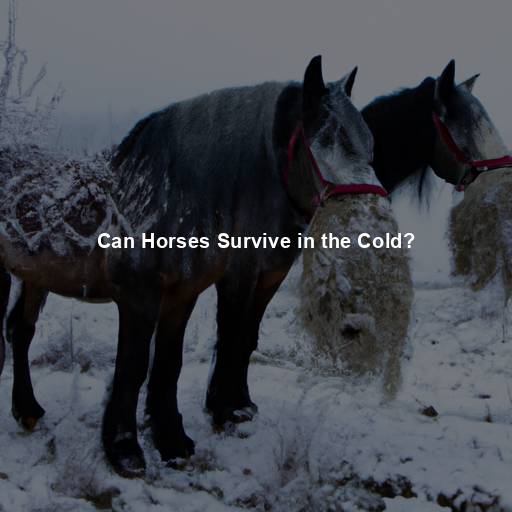Can Horses Survive in the Cold?
Last Updated on November 23, 2023 by Evan
Contents [hide]
- 1 Understanding the Adaptability of Horses to Cold Weather
- 1.1 The Natural Resilience of Horses
- 1.2 The Role of Shelter
- 1.3 Adequate Nutrition for Cold Weather
- 1.4 The Importance of Hydration
- 1.5 Exercise and Turnout
- 1.6 Blanketing Considerations
- 1.7 Monitoring Health and Well-being
- 1.8 Understanding the Importance of Body Condition Score
- 1.9 Recognizing and Addressing Cold-Related Health Issues
- 1.10 Preparing for Severe Winter Weather
- 1.11 Brushing and Cleaning
- 1.12 Managing Moisture
- 1.13 Tail and Mane Care
- 1.14 Hoof Care
- 1.15 Exercise and Mental Stimulation
- 2 Exploring Winter Riding Considerations
- 3 FAQs – Can Horses Survive in the Cold?
- 3.1 Can horses withstand cold temperatures?
- 3.2 What temperature is too cold for horses?
- 3.3 Do horses need shelter in the winter?
- 3.4 What should horses eat during the winter months?
- 3.5 How can I keep my horses hydrated in the cold weather?
- 3.6 What other precautions should I take to keep my horses safe in the cold?
Understanding the Adaptability of Horses to Cold Weather
The awe-inspiring elegance and indomitable power of horses have forged an enduring bond between these regal beings and humanity. As we traverse the vast landscapes of untamed wilderness or the confines of our warm, cozy stables, we ponder upon a curious inquiry: can horses thrive amidst frosty realms? Brace yourself, dear reader, for an expedition into the enigmatic realm of equine adaptability and their ingenious coping mechanisms in the face of frigid temperatures.
The Natural Resilience of Horses
Horses, being herbivores, have evolved to withstand the challenges of colder climates. Their thick, dense coat acts as a formidable barrier against the cold. The hair follicles in their skin produce natural oils that help insulate and protect their bodies. Additionally, horses possess a remarkable ability to regulate their body temperature, allowing them to conserve heat during cold weather.
The Role of Shelter
While horses possess inherent resilience, providing them with appropriate shelter is crucial to their well-being in colder climates. A well-designed and insulated shelter, such as a barn or a run-in shed, can offer horses protection from harsh winds, snow, and rain. The shelter should be well-ventilated, allowing fresh air to circulate while preventing drafts. Bedding made of straw or wood shavings can also provide additional warmth and comfort.
Adequate Nutrition for Cold Weather
As the seasons change and the frosty grip of winter settles in, caring for your equine companion becomes a delicate dance of nutrition and well-being. In the face of plummeting temperatures, ensuring your horse’s health and vitality may leave you tangled in a web of perplexing choices. Fear not, for there is a path that reveals itself amidst this burst of uncertainty. A balanced and nourishing diet becomes paramount, as our equine friends require an extra surge of calories to stoke their inner furnace.
The Importance of Hydration
Ensuring proper hydration is vital for horses year-round, including during winter. While horses may drink less water in colder weather, it is crucial to monitor their water intake and ensure a continuous supply of fresh, unfrozen water. Some horses may prefer slightly warmed water, which can encourage them to drink more. Adequate hydration is essential for maintaining overall health and preventing issues such as impaction colic.
Exercise and Turnout
As the temperatures drop, it’s crucial not to neglect your equine companions’ fitness routines. Just because it’s chilly outside doesn’t mean horses should be confined to their stables, oh no! It’s actually imperative to keep them moving and limber to avoid any winter woes. However, we mustn’t overlook the treacherous nature of icy terrains; a slippery slip and a hoof gone astray can lead to quite the equine conundrum.
Blanketing Considerations
The use of blankets for horses in cold weather is a topic of debate among equine enthusiasts. While blankets can provide an extra layer of warmth, they should be used judiciously. Horses naturally adapt to the changing seasons and grow a thick winter coat. Blankets should only be used when necessary, such as during extreme weather conditions or for older or ill horses who may struggle to regulate their body temperature effectively.
Monitoring Health and Well-being
Regular monitoring of a horse’s health and well-being is crucial, regardless of the season. During colder weather, it is important to be vigilant for signs of discomfort or illness. Common issues in cold weather include weight loss, respiratory problems, and hoof issues. Regular veterinary check-ups, proper nutrition, and providing suitable shelter can help prevent and address these concerns.
Understanding the Importance of Body Condition Score
Keeping tabs on a horse’s body condition score (BCS) is an absolute must, regardless of the weather conditions, especially when the mercury plummets. This score takes into account a horse’s adipose tissue, muscle definition, and weight distribution. Maintaining an ideal BCS throughout the chilly months is paramount, as it directly influences the horse’s capacity to brave the cold. Horses on the leaner side of the BCS scale may struggle to regulate their body temperature, rendering them more vulnerable to the bone-chilling weather.
Feeding Strategies for Winter Months
To help horses maintain an optimal BCS during winter, adjustments can be made to their feeding strategies. Increasing the amount of good-quality hay or providing access to pasture with winter forage can help meet their increased caloric needs. Some horse owners choose to supplement with concentrates or feeds specifically formulated for cold weather conditions. It is important to consult with a veterinarian or equine nutritionist to determine the most suitable feeding plan for individual horses based on their age, activity level, and overall health.
Recognizing and Addressing Cold-Related Health Issues
When the temperature drops and winter sets in, horses are faced with a myriad of perplexing health challenges that demand our utmost attention. As guardians of these majestic creatures, we must navigate through the treacherous realm of potential issues that cold weather unveils. From frosty mornings to biting winds, these equine companions require our diligent care and precaution to ensure their well-being. Let us delve into the entangled web of cold-related health concerns and unravel the intricate measures we must undertake to safeguard our noble steeds.
Respiratory Health
As temperatures take a chilling dip, our noble equine companions find themselves facing an unexpected challenge: a heightened vulnerability to respiratory woes. The frigid air becomes a treacherous accomplice, opening the door to bronchitis and pneumonia, all while horses innocently graze in its midst. To shield our majestic friends from the perils of wintry winds, ensuring the barn boasts impeccable ventilation sans disruptive drafts is of paramount importance. Additionally, diligent stall cleansing and rigorous manure management prove indispensable allies in the battle against tantalizing respiratory irritants.
Hoof Care
As the clouds darken and the chilly raindrops descend upon us, it’s not just us humans who feel the effects of the gloomy weather. Horses, majestic creatures that roam the fields, are not spared from the burdens of mother nature. The cold and damp conditions can wreak havoc on their delicate hooves, resulting in troubling ailments like thrush and abscesses. However, fear not, dear equestrians!
Dental Care
When the chill of winter settles in, our equine companions may find themselves grappling with the challenge of grazing and chewing amidst the frosty terrain. In order to optimize their dental well-being and minimize any unease during mealtime, it is imperative to embark on a journey of regular dental check-ups and the gentle artistry of teeth floating, smoothing out any potential obstacles that may hinder their gustatory endeavors. By addressing these concerns head-on, we can rest assured that our four-legged friends will navigate the intricacies of their winter nourishment with ease and grace.
Preparing for Severe Winter Weather
When the frosty grip of winter tightly embraces certain areas, it becomes paramount to brace oneself for the untamed wrath of the elements. In the realm of equine aficionados, those who cherish the majestic presence of horses, the stakes are even higher. A peculiar dance must be orchestrated, a symphony of preparedness, to ensure the well-being of these graceful creatures amidst harsh weather episodes. Here, we delve into a few perplexities that the valiant horse owners must navigate with meticulous care.
Emergency Preparedness
In these uncertain times, it is of utmost importance to be prepared for any unforeseen circumstances. Creating a solid emergency plan is crucial in safeguarding your well-being and that of your loved ones. This entails guaranteeing access to ample food and water provisions, making provisions for alternative power sources to ensure hot water availability, and establishing open lines of communication with local veterinary professionals or reliable equine emergency services. It is through such thoughtful preparations that we can navigate through the labyrinth of uncertainties with peace of mind.
Winter Tack and Equipment
Winter brings about a myriad of challenges for both horse and rider, requiring strategic choices in tack and gear that embrace both comfort and safety. Ensuring a harmonious experience amidst the frosty elements entails equipping your trusty steed with snugly fitting blankets, insulated saddle pads, and footwear that wards off treacherous slips on icy terrains. By proactively addressing these needs, you pave the way for a winter equestrian journey brimming with peace of mind and optimal performance.
Brushing and Cleaning
Keeping your horse’s coat in top condition doesn’t just make them look magnificent, it also has a surprising impact on their overall well-being. By regularly brushing your equine companion, you’re not only whisking away pesky dirt and tangled hair, but you’re also fostering optimal air circulation and preserving the protective abilities of their winter coat. Embrace the perplexing benefits of grooming, because it’s not only about beautifying your horse, but also about safeguarding their skin from potential issues and ensuring their comfort.
Managing Moisture
Moisture can be a challenge during winter, and it is important to manage it effectively. Sweat and moisture trapped under blankets or in the coat can lead to skin issues, such as rain rot or fungal infections. Regular grooming helps distribute natural oils throughout the coat, preventing moisture buildup. Drying off a sweaty horse after exercise or removing wet blankets promptly can also help prevent these issues.
Tail and Mane Care
Taking good care of your horse’s mane and tail is crucial, especially during the chilly winter season when they tend to become more delicate and prone to damage. It’s essential to dedicate time to regular brushing and detangling sessions, as this will effectively prevent those frustrating knots and unruly mats from forming. To make the process easier and reduce hair loss, consider incorporating a detangling spray into your grooming routine or opt for a wide-toothed comb for gentle, effective detangling.
Hoof Care
As the seasons change and winter sets in, it’s crucial to remember that hoof care should never take a backseat. Ensuring your equine companion’s hooves are in optimal condition is an ongoing process that demands attention, even in the face of frosty challenges. By diligently picking and cleaning hooves, you can ward off the treacherous trio of snow, ice, and mud, which can effortlessly turn comfort into agony. Moreover, sparing a moment to apply a well-suited hoof conditioner or moisturizer will work wonders in fortifying hoof health, safeguarding against dreaded cracks and unwanted dryness.
Exercise and Mental Stimulation
Keeping horses active and engaged is absolutely crucial for their overall health and happiness, especially when the frosty winter months test our enthusiasm for outdoor exercise. Whether it’s trotting around the lunge line, embarking on a scenic ride, or engaging in groundwork exercises, these experiences provide much-needed physical and mental stimulation for our majestic equine companions. And while Mother Nature might occasionally throw us a curveball with extreme weather conditions, fear not, for there are still plenty of indoor exercise options available, such as the trusty round pen or the comforting confines of an indoor arena, to keep our four-legged friends moving and grooving. So, saddle up and embrace the spirit of adventure, for a vibrant and active winter awaits!
Exploring Winter Riding Considerations
As the chilly embrace of winter wraps around us, horse enthusiasts brave the elements to indulge in the exhilarating experience of riding. However, navigating the snowy terrain and icy winds requires careful attention to guarantee the well-being and contentment of both the noble steed and its intrepid rider. Let us explore the intricate tapestry that is winter riding, unveiling the essential considerations that encompass safety and comfort, weaving a harmonious symphony amidst the frosty backdrop.
Warm-Up and Cool-Down
As the chilly winds sweep across the equestrian world, it’s time to unravel the mysterious powers of warm-up and cool-down routines. Like a intricate dance between horse and rider, these rituals hold the key to unlocking the hidden potential within these majestic creatures. With a delicate touch, they ease their muscles into action, beckoning the beast to step into the realm of exercise. And as the sweat begins to glisten upon their noble brow, a gradual descent back to normality embraces them, as their body temperature gently finds its equilibrium.
Footing and Surface Conditions
As winter sets in, it becomes paramount to keep a close eye on the footing conditions when going out for rides. The unpredictability of icy or bumpy surfaces can add a dash of uncertainty to your equine adventure, magnifying the potential danger of slips and tumbles. To navigate this labyrinth of risk, it is wise to opt for riding in spaces that boast impeccable footing, such as an indoor arena or a meticulously cared-for outdoor arena. By doing so, you can take a proactive step towards safeguarding yourself and your gentle companion from the perils of winter rides.
Layering Clothing
With the frosty winds nipping at our cheeks and the icy trails beckoning us to ride, it’s high time we discuss the art of winter cycling attire. Embrace the enigmatic dance of layers – a symphony of warmth and adaptability – as you prepare to defy the winter’s cruel whims. Seek solace in insulated and waterproof boots that ward off the sinister wetness, while donning gloves that mold to your hands like a second skin. And oh, the headgear!
Visibility and Daylight
As the winter season takes hold, the celestial curtain of darkness is drawn earlier, enveloping riders in a labyrinth of perplexing challenges. To navigate these treacherous conditions, selecting well-lit routes becomes paramount, as the dimmed visibility can be an unsolicited quagmire of uncertainty. Embrace the luminescent saviors – reflective gear and equipment – as steadfast allies to amplify your presence in the ethereal gloaming, ensuring safety during those enigmatic twilight rides.
Monitoring Body Temperature
As the winter season takes hold, keeping a close watch on your horse’s body temperature becomes essential to strike the perfect balance between cozy warmth and shivering cold. An excessive bout of sweating might expose your equine companion to an unwelcome chill, whereas insufficient insulation can trigger a dampened sense of comfort. Finding the sweet spot lies in meticulously adjusting the intensity and duration of your rides, in sync with your horse’s individual tolerance and response to exercise, thus ensuring their ultimate contentment.
FAQs – Can Horses Survive in the Cold?
Can horses withstand cold temperatures?
When it comes to enduring chilly climates, horses are true marvels of nature. Sporting a magnificent winter coat, they boast an unrivaled defense mechanism against frigid conditions. As temperatures plummet, their hair defiantly stands up, crafting an impenetrable barrier that shields their bodies from the biting cold. But let’s not forget the wonders of their circulatory system – an intricate web that cunningly redirects blood away from their extremities, preserving warmth within their vital organs. Brave as they may be, horses might still face challenges if the freezing weather collides with wind, humidity, or a lack of shelter.
What temperature is too cold for horses?
Horses are generally comfortable in temperatures as low as 5 to 20 degrees Fahrenheit (-15 to -6 degrees Celsius), depending on their health, age, and overall condition. With appropriate shelter, food, and water, they can withstand even colder temperatures. However, when the temperature drops below freezing, it’s important to take certain precautions to ensure their safety and well-being.
Do horses need shelter in the winter?
Providing horses with suitable shelter is essential during the winter. This can be a well-constructed barn, shed, or even a three-sided shelter that protects them from the wind and precipitation. A shelter provides horses with a place to escape cold drafts, snow, rain, and freezing rain. It also helps prevent them from getting wet, which can contribute to hypothermia. Even if horses have access to shelter, it is crucial to keep it well-maintained and free from drafts.
What should horses eat during the winter months?
As the wintry winds begin to blow, our equine companions find themselves in need of a little extra TLC to brave the cold. Enter the humble hay feast! Much more than a mere meal, hay serves as a cozy hearth within a horse’s tummy, generating precious warmth that radiates from their core. Of course, a hearty meal calls for a refreshing sip, so be sure to keep their water flowing and free from icy shackles. And let’s not forget the sprinkling of essential minerals and salts, for in the frosty embrace of winter, their bodies crave a little extra nourishment. With these vital ingredients in place, our four-legged friends can trot through the chilly season with vigor and vitality. Winter, be warned – horses are ready to burst through your perplexing ice and embrace the burst of warmth within!
How can I keep my horses hydrated in the cold weather?
Horses, much like humans, rely on the goodness of clean, unfrozen water to thrive and restore their majestic vitality. We all know water is the unsung hero for their digestion, temperature harmony, and overall well-being. But let’s be honest, nature’s mischief loves to play unpredictable games with freezing waters. Fear not, fellow equestrian enthusiasts! Embrace a realm of possibilities, from the charm of insulated water buckets to the magic of heated waterers, or even savoring the spectacle of electrically heated stock tank units. Just remember, diligence is the secret potion for success – never forget to frequently check the water sources, for even the most stubborn icicles can surprise us during the harshest winter’s reign.
What other precautions should I take to keep my horses safe in the cold?
Aside from providing shelter, sufficient food, and clean water, you can take additional measures to keep your horses safe in the cold. Regularly checking their blankets or blankets can help prevent overheating or discomfort caused by wet or improperly fitting coverings. Regular hoof care is also important since snow, ice, and frozen ground can lead to injury or discomfort. Developing a winter-specific feeding and exercise plan with guidance from a veterinarian or equine nutritionist can further ensure the well-being of your horses during the colder months.







